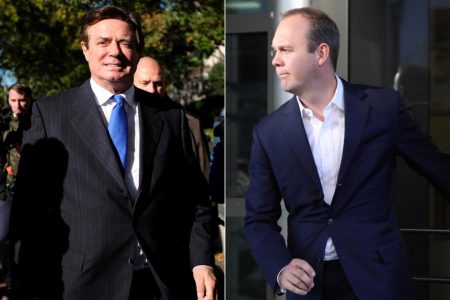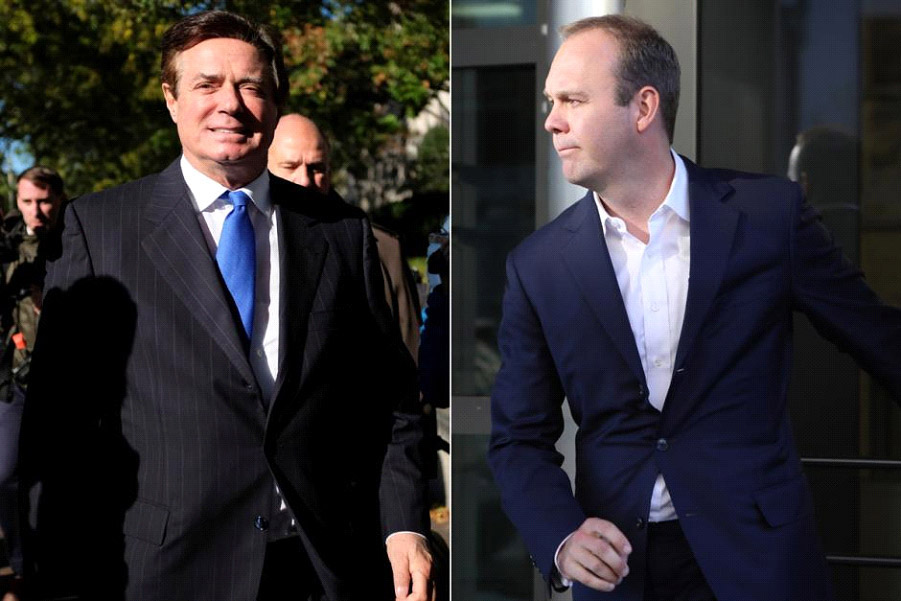WASHINGTON, (Reuters) – Federal investigators probing Russian interference in the 2016 U.S. election charged President Donald Trump’s former campaign manager Paul Manafort and another aide, Rick Gates, with money laundering yesterday.
A third former Trump adviser, George Papadopoulos, pleaded guilty in early October to lying to the FBI, it was announced yesterday.
It was a sharp escalation of U.S. Justice Department Special Counsel Robert Mueller’s five-month-old investigation into alleged Russian efforts to tilt the election in Trump’s favour and into potential collusion by Trump aides.
Manafort, 68, a longtime Republican operative, and Gates were arraigned at a federal courthouse in Washington.
Both men pleaded not guilty to the charges in a 12-count indictment, ranging from money laundering to acting as unregistered agents of Ukraine’s former pro-Russian government.
The judge ordered house arrest for both men, and set a $10 million unsecured bond for Manafort and a $5 million unsecured bond for Gates. With unsecured bonds, they are released without having to pay but will owe money if they fail to appear in court. There will be another hearing on Thursday.
The developments in the Mueller probe weighed on the U.S. dollar, which slipped 0.5 percent against a basket of currencies.
Mueller’s investigation and others by congressional committees into alleged Russian efforts to influence the election have cast a shadow over Trump’s first nine months in office.
U.S. intelligence agencies say Russia interfered in the election by hacking and releasing embarrassing emails and disseminating propaganda via social media to discredit Democratic presidential candidate Hillary Clinton. Russia denies the allegations and Trump denies any collusion.
Neither Trump nor his campaign was mentioned in the indictment against Manafort and Gates. The charges, some going back more than a decade, center on Manafort’s work for Ukraine.

The indictment includes accusations of conspiracy against the United States, failure to report foreign bank accounts to the U.S. government and conspiracy to launder money, a count that carries a 20-year maximum prison sentence.
A White House spokeswoman said the indictment had nothing to do with Trump or his campaign and showed no evidence of collusion between the campaign and Russia.
“We’ve been saying from Day One there’s no evidence of Trump-Russia collusion, and nothing in the indictment today changes that at all,” spokeswoman Sarah Sanders told a news briefing.
Manafort’s attorney, Kevin Downing said in a statement that there was no evidence the Trump campaign colluded with the Russian government. Downing said Manafort’s work for the Ukrainians ended in 2014, two years before he joined the Trump campaign.
Downing accused Mueller of using a “novel” legal theory to prosecute Manafort under a law requiring lobbyists to register with the Department of Justice when they are doing work for a foreign government.
In a development directly related to Trump’s 2016 election campaign, it emerged yesterday that Papadopoulos, a former campaign adviser, pleaded guilty earlier this month to making false statements to Federal Bureau of Investigation agents.
Mueller’s office said Papadopoulos lied to FBI agents about the timing of contact between him and a professor in London who claimed to have information that would hurt Clinton.
Papadopoulos, a little-known former foreign policy adviser in the campaign, made a plea bargain that stated he had since “met with the Government on numerous occasions to provide information and answer questions,” according to a court document.
Sanders, the White House spokeswoman, said Papadopoulos’ role in the campaign was “extremely limited” and that he was a volunteer.
“He asked to do things (and) he was basically pushed back or not responded to in any way,” she said.
In a May 4 email quoted in the Papadopoulos indictment, a Trump campaign employee forwarded a message from Papadopoulos proposing a meeting between Trump and the Russian government to another campaign official.
The employee included a note, according to the indictment, that read: “Let’s discuss. We need someone to communicate that DT is not doing these trips. It should be someone low level in the campaign so as not to send any signal.”
A source in Washington, who did not want to be identified and who has seen the email, said the sender was Manafort and the recipient was Gates.
Manafort ran the Trump campaign from June to August of 2016 before resigning amid reports he might have received millions of dollars in illegal payments from a pro-Russian political party in Ukraine.
Trump reiterated his frustration on Monday with the Mueller probe, which he has called “a witch hunt.”
“Sorry, but this is years ago, before Paul Manafort was part of the Trump campaign. But why aren’t Crooked Hillary & the Dems the focus?????,” Trump wrote on Twitter, referring to Clinton.
Mueller has been investigating Manafort’s financial and real estate dealings and his prior work for a political group, the Party of Regions, which backed former pro-Kremlin Ukrainian President Viktor Yanukovich.
Both Manafort and Gates generated tens of millions of dollars of income from Ukraine work and laundered money through scores of U.S. and foreign entities to hide payments from American authorities, the indictment said.
They concealed from the United States their work and revenue as agents of Ukrainian political parties and used their wealth to lead a “lavish lifestyle” without paying taxes on the income, it said.
The indictment said Manafort owned properties in Manhattan, Brooklyn, the Hamptons, Arlington, Virginia, and elsewhere.
Prosecutors said Manafort spent almost $1 million on eight rugs in two years and more than $1.3 million on clothes from shops in Beverly Hills, California, and New York City. They also said he had been making payments on four Range Rovers and a Mercedes-Benz.
Gates was a longtime business partner of Manafort and has ties to Russian and Ukrainian oligarchs. He also served as deputy to Manafort during his brief tenure as Trump’s campaign chairman.

